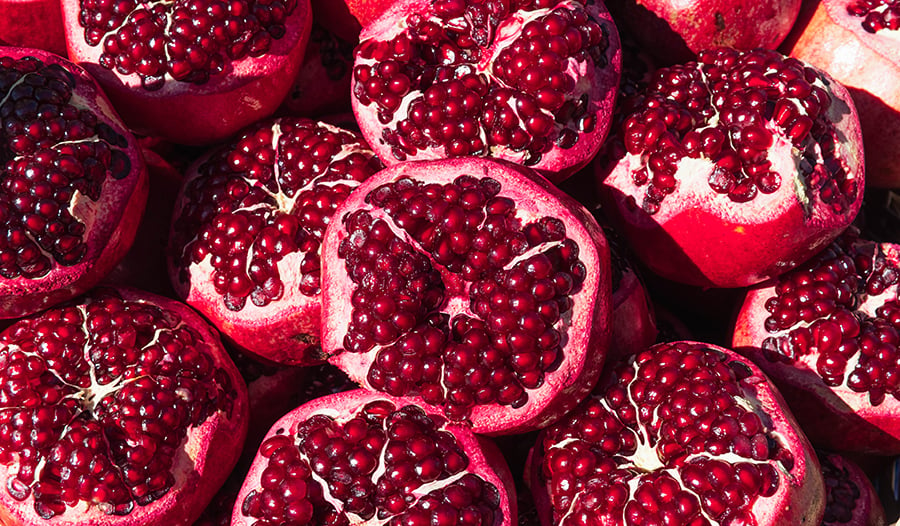Urolithin A: Benefits For Health and Aging

Explore the benefits of urolithin A, a natural postbiotic compound produced in the gut that supports mitochondrial health and may hold benefits for muscle function, brain, heart, and skin health.
What makes urolithin A interesting is its potential beneficial impact on mitochondria, which are the powerhouses of your cells that help your body produce energy. Since your mitochondria are key players in so many of your body's functions, anything that helps them stay healthy will have a trickle-down effect, leading to many other notable benefits for your muscles, brain, heart, and overall health.3
Though gut bacteria can make urolithin A when you eat certain foods, not everyone can produce it. As such, some people choose to incorporate urolithin A supplements in their health regimen to reap its potential benefits.
What Is Urolithin A?
Urolithin A is a natural compound produced by gut bacteria when you eat or drink foods that contain ellagitannins, a type of polyphenol.1 Ellagitannins are found naturally in nuts and fruits like pomegranates, certain berries, walnuts, and almonds.2
When ellagitannins reach your small intestine, they can be broken down and release a compound called ellagic acid, which your gut flora can change into urolithins, including urolithin A.4
Urolithins are postbiotics, which are byproducts of beneficial bacteria feeding on fiber that have a number of health benefits. Urolithin A is the first postbiotic found to stimulate mitophagy—the cleaning up and recycling of mitochondria.5
However, some people can't break down ellagitannins depending on their individual metabolism. What types and amounts of urolithins you produce depends on which bacteria live in your gut.6 In fact, one study showed that only about 40% of participants produced urolithin A after consuming pomegranate juice.7
Benefits Of Urolithin A
All of the benefits of urolithin A stem from how it improves mitochondrial health. Mitochondria are the key to everything in your body working better. They break down glucose and fatty acids from the foods you eat into smaller molecules, sparking a process that creates ATP, the energy of your cells.3
Over time, those hardworking mitochondria become worn down and damaged, making them less efficient. Old mitochondria can also create harmful substances that can damage DNA proteins, causing oxidative stress that leads to aging and disease.8
Cells can identify and tag mitochondria that no longer function well, triggering structures called autophagosomes to surround them and transport them to lysosomes. Here, they are broken down and reused to create brand-new, healthy mitochondria. This entire process is called mitophagy.7
Urolithin A can stimulate mitophagy, which makes it of particular interest to researchers since mitophagy starts to slow down as you age, making cells function less effectively.9 Declining cell function with age means less energy, more fatigue and inflammation, and increased risks for age-related diseases like arthritis, Alzheimer's disease, and heart disease.
However, diet and lifestyle modifications can help, including physical activity and eating an antioxidant-rich diet low in highly processed foods.10 Increasing your urolithin A levels is another way to boost cell function by improving mitochondrial health.
May Improve Muscle Function and Strength
One study on 40 to 65-year-olds found that urolithin A can increase muscle strength by about 12% compared to a placebo and improve several biomarkers of mitochondrial health.1 The researchers believe the mitochondria in muscle cells could work more efficiently with the aid of urolithin A, meaning they can work harder and longer, so you get better results from strength training and slow down age-related strength loss.
Helps Manage Inflammation
The same study on muscle strength also found urolithin A lowered inflammation levels. Older, damaged mitochondria can create harmful substances that cause inflammation, so destroying them efficiently with the support of urolithin A can help manage inflammation levels.11
Supports Cardiovascular Health
Your heart is a muscle that demands a lot of energy to function well, so the healthier your mitochondria, the better. Research also shows that urolithin A intake can boost blood vessel function, potentially by increasing bacteria that produce helpful compounds linked to blood vessel health.12
Promotes Brain Health and Cognitive Function
Another energy-hungry organ is your brain. More efficient and healthy mitochondria are better able to power your brain and don't release inflammation-causing substances. Keeping inflammation levels in the brain down helps ward off age-related cognitive decline and diseases like Alzheimer's.13
Encourages Healthy Skin
Emerging evidence shows promise for urolithin A in supporting healthy skin in a number of ways.
- May boost collagen production for firmer, smoother skin.14
- May protect against oxidative stress protection that causes skin aging.15
- May encourage autophagy, turning over new cells for healthier looking skin.16
- May promote better and faster cell regeneration in wound healing.14
Should You Supplement With Urolithin A?
The production of urolithin A in your colon depends on your individual microbiome and taking it as a dietary supplement can increase your levels so you gain the potential benefits. Always consult your healthcare provider first to ensure that supplementation with urolithin A is right for you.
Human clinical trials have shown that urolithin A can be safely administered in doses of up to 2000 mg per day with no serious adverse effects,17, 18 although you should never exceed the amount indicated by the dosing regimen on the product label. Check product labels for third-party testing certification to ensure quality standards.
Side Effects and Safety
There is some evidence that doses of up to 1000 mg per day can cause mild digestive upset or an increased incidence of headaches.1 No adverse drug-drug interactions of urolithin A are currently known.
Natural sources of ellagitannins, including nuts and berries, are generally safe to consume in moderation. While pomegranates and their juice are fantastic sources of ellagitannins, some constituents of pomegranate juice may inhibit enzymes responsible for metabolizing certain medications, such as warfarin, which could cause adverse physiological effects.19 Additionally, ellagic acid can decrease blood glucose, which in combination with diabetes medications, may lower blood glucose to unsafe levels.20
Takeaway
Urolithin A is a natural postbiotic compound produced in the gut when consuming foods rich in ellagitannins, such as pomegranates, berries, and nuts. It supports mitochondrial health, benefiting muscle function, and brain, heart, and skin health. However, not everyone naturally produces urolithin A, leading some to use supplements to harness its potential benefits for energy production and overall cellular health.
References:
- Singh A, D’Amico D, Andreux PA, et al. Urolithin A improves muscle strength, exercise performance, and biomarkers of mitochondrial health in a randomized trial in middle-aged adults. Cell Reports Medicine. 2022;3(5):100633.
- Heber D. Pomegranate Ellagitannins. In: Benzie IFF, Wachtel-Galor S, editors. Herbal Medicine: Biomolecular and Clinical Aspects. 2nd edition. Boca Raton (FL): CRC Press/Taylor & Francis; 2011. Chapter 10. Available from: https://www.ncbi.nlm.nih.gov/books/NBK92772/
- Cooper GM. The Cell: A Molecular Approach. 2nd edition. Sunderland (MA): Sinauer Associates; 2000. Mitochondria. Available from: https://www.ncbi.nlm.nih.gov/books/NBK9896/
- Garcia-Muñoz C, Vaillant F. Metabolic fate of ellagitannins: implications for health, and research perspectives for innovative functional foods. Critical Reviews in Food Science and Nutrition. 2014;54(12):1584-1598.
- Ryu D, Mouchiroud L, Andreux PA, et al. Urolithin A induces mitophagy and prolongs lifespan in C. elegans and increases muscle function in rodents. Nat Med. 2016;22(8):879-888.
- Kotewicz M, Lewko B. Urolithins and their possible implications for diabetic kidney. Eur J Trans Clin Med. 2022;5(1):53-63.
- Singh A, D’Amico D, Andreux PA, et al. Direct supplementation with Urolithin A overcomes limitations of dietary exposure and gut microbiome variability in healthy adults to achieve consistent levels across the population. Eur J Clin Nutr. 2022;76(2):297-308.
- Picca A, Faitg J, Auwerx J, Ferrucci L, D’Amico D. Mitophagy in human health, ageing and disease. Nat Metab. 2023;5(12):2047-2061.
- López-Otín C, Blasco MA, Partridge L, Serrano M, Kroemer G. The hallmarks of aging. Cell. 2013;153(6):1194.
- McDade TW. Three common assumptions about inflammation, aging, and health that are probably wrong. Proc Natl Acad Sci USA. 2023;120(51):e2317232120.
- Jiménez-Loygorri JI, Villarejo-Zori B, Viedma-Poyatos Á, et al. Mitophagy curtails cytosolic mtDNA-dependent activation of cGAS/STING inflammation during aging. Nat Commun. 2024;15(1):830.
- Nishimoto Y, Fujisawa K, Ukawa Y, et al. Effect of urolithin A on the improvement of vascular endothelial function depends on the gut microbiota. Frontiers in Nutrition. 2023;9:1077534.
- An L, Lu Q, Wang K, Wang Y. Urolithins: a prospective alternative against brain aging. Nutrients. 2023;15(18):3884.
- Feng Z hua, Chen J, Yuan P tao, et al. Urolithin a promotes angiogenesis and tissue regeneration in a full-thickness cutaneous wound model. Frontiers in Pharmacology. 2022;13:806284.
- Kothe B, Klein S, Petrosky SN. Urolithin a as a potential agent for prevention of age-related disease: a scoping review. Cureus. 2023;15(7):e42550.
- Sahashi H, Kato A, Yoshida M, et al. Urolithin A targets the AKT/WNK1 axis to induce autophagy and exert anti-tumor effects in cholangiocarcinoma. Front Oncol. 2022;12:963314.
- Andreux PA, Blanco-Bose W, Ryu D, et al. The mitophagy activator urolithin A is safe and induces a molecular signature of improved mitochondrial and cellular health in humans. Nat Metab. 2019;1(6):595-603.
- Liu S, D’Amico D, Shankland E, et al. Effect of urolithin A supplementation on muscle endurance and mitochondrial health in older adults: a randomized clinical trial. JAMA Netw Open. 2022;5(1):e2144279.
- Mansoor K, Bardees R, Alkhawaja B, et al. Impact of pomegranate juice on the pharmacokinetics of cyp3a4- and cyp2c9-mediated drugs metabolism: a preclinical and clinical review. Molecules. 2023;28(5):2117.
- Amor AJ, Gómez-Guerrero C, Ortega E, Sala-Vila A, Lázaro I. Ellagic acid as a tool to limit the diabetes burden: updated evidence. Antioxidants. 2020;9(12):1226.
DISCLAIMER:This Wellness Hub does not intend to provide diagnosis...
















































































 Table of Contents
Table of Contents















